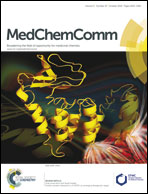Synthesis of 1-O-acetylbritannilactone analogues from Inula britannica and in vitro evaluation of their anticancer potential†
Abstract
The natural product 1-O-acetylbritannilactone (ABL), a sesquiterpene lactone (STL) isolated from flowers of the medicinal plant Inula britannica, was found to have potent anticancer activity in vitro. Previous studies showed that the 6-OH side chain ester analogues of ABL displayed better anticancer activity. In order to look for new natural-product-based anticancer agents, a series of novel ABL analogues was synthesized by N/O-atom introduction and aromatic ring esterification at the 6-OH position of ABL, and the in vitro anticancer activities and mechanistic basis of cytotoxicity of the resulting compounds were investigated. Treatment of HeLa cells with the representative active compound 4a showed induction of apoptosis, as revealed by a biparametric cytofluorimetric analysis, and activation of caspase-3. The ability of 4a to obviously arrest the cell cycle at the G2/M phase was confirmed by flow cytometric analysis.


 Please wait while we load your content...
Please wait while we load your content...